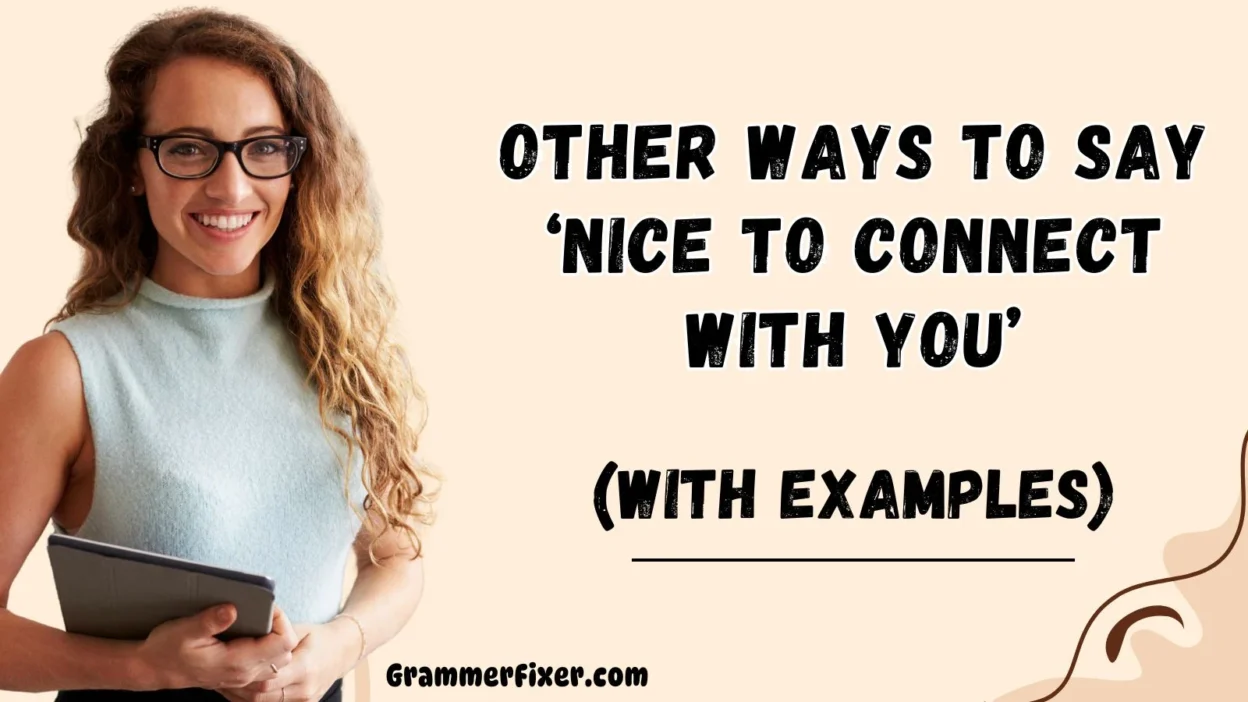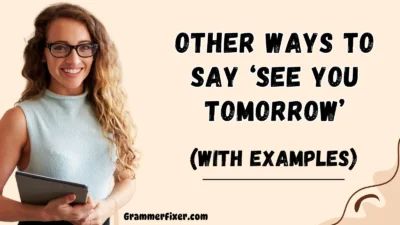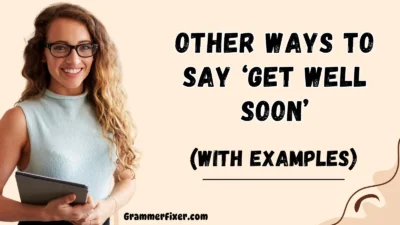Finding the right words to express warmth and care when you meet someone—whether in-person, over email, or in a virtual setting—can transform a simple greeting into a meaningful connection. Choosing the right phrase helps you convey sincerity, professionalism, and personality while leaving a lasting impression.
In this guide, we’ll explore 30 thoughtful, versatile alternatives that you can use across professional, casual, and digital interactions to make every introduction feel genuine and memorable.
What Does “Nice to Connect with You” Mean?
At its core, “Nice to Connect with You” is a polite, friendly acknowledgment that you’ve met someone or started a conversation—whether face-to-face, online, or via email.
It’s often used in professional contexts, such as LinkedIn introductions, networking events, and first-time client calls, but it can also work in casual situations.
Is It Professional/Polite to Say “Nice to Connect with You”?
Yes—it’s both professional and polite. The phrase has become a standard digital-era equivalent of saying “Nice to meet you” and works well in emails, LinkedIn messages, and video calls.
However, overuse can make it sound generic or cliché, so having fresh alternatives is a great way to keep your communication warm and original.
Advantages and Disadvantages
Advantages:
- Friendly and approachable without being too casual
- Works in most settings: professional, semi-formal, and casual
- Safe and polite—unlikely to offend
- Quick and easy to use
Disadvantages:
- Can feel overused and impersonal if used repeatedly
- Lacks emotional depth compared to more personalized phrases
- May not fully capture your enthusiasm or intent
1. Great to Connect with You
Meaning: Expresses genuine satisfaction about the new connection.
Detailed Explanation: Slightly more enthusiastic than “Nice to connect with you,” making it ideal when you want to sound warm but still professional.
Scenario Example: “Great to connect with you on LinkedIn. I look forward to exploring possible collaborations.”
Best Use: First-time introductions in a professional networking context.
Tone: Warm, professional, and optimistic.
2. It’s a Pleasure to Connect
Meaning: Conveys a sense of formality and respect.
Detailed Explanation: Adds a touch of grace and sophistication while keeping the message approachable.
Scenario Example: “It’s a pleasure to connect and learn more about your innovative work in marketing.”
Best Use: Business introductions, emails to new clients, or formal networking events.
Tone: Polite, refined, professional.
3. Glad We Could Connect
Meaning: Suggests you’re happy the conversation or introduction happened.
Detailed Explanation: Slightly casual, works well when the meeting took effort to arrange.
Scenario Example: “Glad we could connect before the conference next week.”
Best Use: Networking events, conference follow-ups.
Tone: Friendly, casual-professional.
4. Delighted to Connect
Meaning: Shows genuine joy about the interaction.
Detailed Explanation: Perfect for moments when you want to convey authentic excitement.
Scenario Example: “Delighted to connect and exchange ideas on creative strategies.”
Best Use: Creative industries, enthusiastic networking.
Tone: Warm, energetic, personable.
5. Happy to Connect
Meaning: Simple, friendly acknowledgment of the new link.
Detailed Explanation: Best for casual conversations or follow-ups where a formal tone isn’t necessary.
Scenario Example: “Happy to connect—your work in product development is inspiring.”
Best Use: Social media introductions, informal emails.
Tone: Friendly, approachable.
6. Thrilled to Connect
Meaning: Conveys strong enthusiasm and excitement about the new connection.
Detailed Explanation: Works well when you’ve been looking forward to meeting someone, especially if they have a strong professional reputation or a role you admire.
Scenario Example: “Thrilled to connect and discuss potential opportunities for collaboration.”
Best Use: Networking with high-value contacts, enthusiastic follow-ups.
Tone: Energetic, passionate, forward-looking.
7. It’s Wonderful to Connect
Meaning: Highlights joy and positive emotion in meeting someone.
Detailed Explanation: Adds warmth and sincerity, making the interaction feel memorable.
Scenario Example: “It’s wonderful to connect and hear about your exciting new project.”
Best Use: Creative industries, client meetings, mentorships.
Tone: Heartfelt, warm, encouraging.
8. I’m Grateful We Connected
Meaning: Shows gratitude for the new relationship or interaction.
Detailed Explanation: Adds emotional depth, especially if someone introduced you or you’ve been wanting to meet for a while.
Scenario Example: “I’m grateful we connected—thank you for taking the time to talk.”
Best Use: After introductions made through mutual contacts.
Tone: Appreciative, respectful.
9. Delighted to Meet You Online
Meaning: The digital version of a warm in-person greeting.
Detailed Explanation: Acknowledges that the meeting is virtual while keeping it friendly and professional.
Scenario Example: “Delighted to meet you online—your profile really caught my attention.”
Best Use: LinkedIn messages, Zoom introductions, remote networking.
Tone: Friendly, adaptable, professional.
10. I’ve Been Looking Forward to Connecting
Meaning: Implies anticipation and genuine interest in the meeting.
Detailed Explanation: Strongly personalizes the greeting and sets a positive tone for the conversation.
Scenario Example: “I’ve been looking forward to connecting—your insights on leadership are inspiring.”
Best Use: Pre-arranged calls, interviews, collaborations.
Tone: Anticipatory, sincere.
11. Great to Finally Connect
Meaning: Recognizes that the meeting was expected or delayed.
Detailed Explanation: Ideal when there’s been previous email exchanges or mutual awareness before meeting.
Scenario Example: “Great to finally connect after exchanging messages for so long.”
Best Use: Follow-through introductions, scheduled networking.
Tone: Relieved, positive.
12. I’m Excited to Connect
Meaning: Displays genuine energy and enthusiasm.
Detailed Explanation: Perfect when you want to convey optimism about future interactions.
Scenario Example: “I’m excited to connect and explore how our teams might collaborate.”
Best Use: Collaborative projects, partnerships, startup culture.
Tone: Upbeat, collaborative.
13. It’s Great We’ve Connected
Meaning: Confirms and appreciates the new relationship.
Detailed Explanation: A subtle twist that feels conversational and natural.
Scenario Example: “It’s great we’ve connected—I think our skills complement each other.”
Best Use: Informal emails, quick acknowledgments.
Tone: Approachable, friendly.
14. I’m Happy We’ve Connected
Meaning: Straightforward and positive.
Detailed Explanation: Keeps the message light while still showing sincerity.
Scenario Example: “I’m happy we’ve connected—your recent article was inspiring.”
Best Use: Social introductions, casual networking.
Tone: Warm, approachable.
15. It’s a Joy to Connect
Meaning: Adds a touch of charm and heartfelt emotion.
Detailed Explanation: Slightly poetic, making the interaction feel more personal.
Scenario Example: “It’s a joy to connect—your work in community development is truly admirable.”
Best Use: Nonprofit, creative, or community-building contexts.
Tone: Gentle, heartfelt.
16. So Nice to Finally Connect
Meaning: Combines friendliness with acknowledgment of previous delay.
Detailed Explanation: Useful when the meeting took effort or scheduling.
Scenario Example: “So nice to finally connect after hearing so much about you.”
Best Use: Warm follow-up after mutual introductions.
Tone: Friendly, slightly informal.
17. A Pleasure Making Your Acquaintance
Meaning: A classic, formal alternative.
Detailed Explanation: Ideal for traditional business settings or formal written communication.
Scenario Example: “A pleasure making your acquaintance—I look forward to our discussions.”
Best Use: Diplomatic, legal, or high-formality introductions.
Tone: Polite, formal.
18. Great to E-Meet You
Meaning: The casual, digital-age version of “Nice to meet you.”
Detailed Explanation: Perfect for email or chat introductions where the meeting is remote.
Scenario Example: “Great to e-meet you—I’ve heard great things about your work.”
Best Use: Email, LinkedIn, Slack introductions.
Tone: Friendly, modern.
19. I’m Glad We Could Touch Base
Meaning: Suggests a first or follow-up conversation to align ideas.
Detailed Explanation: Works in both first meetings and check-ins.
Scenario Example: “I’m glad we could touch base before the project kickoff.”
Best Use: Business updates, client check-ins.
Tone: Professional, purposeful.
20. It’s an Honor to Connect
Meaning: Conveys deep respect, often for someone of notable status.
Detailed Explanation: Adds formality and esteem to your greeting.
Scenario Example: “It’s an honor to connect with such a respected leader in the field.”
Best Use: Senior leaders, speakers, mentors.
Tone: Formal, respectful.
21. I’m Pleased to Connect
Meaning: A polite, formal acknowledgment of the new relationship.
Detailed Explanation: Works well in professional contexts where you want to sound both respectful and welcoming.
Scenario Example: “I’m pleased to connect and learn more about your recent initiatives.”
Best Use: Initial emails, B2B introductions.
Tone: Formal, professional.
22. It’s Great to Be in Touch
Meaning: Highlights the start of an ongoing conversation.
Detailed Explanation: Suggests you’re looking forward to continued dialogue.
Scenario Example: “It’s great to be in touch—your expertise in sustainability is impressive.”
Best Use: Ongoing networking, professional rapport-building.
Tone: Friendly, positive.
23. I’m Honored We Connected
Meaning: Expresses deep respect and admiration.
Detailed Explanation: Suitable when meeting someone you’ve long respected or whose work inspires you.
Scenario Example: “I’m honored we connected—your leadership journey is remarkable.”
Best Use: Mentorships, industry leaders, high-profile networking.
Tone: Respectful, warm.
24. It’s a Treat to Connect
Meaning: Adds a touch of lighthearted charm.
Detailed Explanation: Best for situations where a slightly playful tone feels appropriate.
Scenario Example: “It’s a treat to connect and share insights on creative storytelling.”
Best Use: Creative industries, informal professional networking.
Tone: Light, warm, casual.
25. Glad to Be Connected
Meaning: Simple yet genuine acknowledgment of the relationship.
Detailed Explanation: Neutral enough for both casual and formal interactions.
Scenario Example: “Glad to be connected—looking forward to working together.”
Best Use: Social media, brief follow-up messages.
Tone: Neutral, professional.
26. I’m Thankful for the Connection
Meaning: Emphasizes gratitude in a heartfelt way.
Detailed Explanation: Good for meaningful professional relationships or introductions through mutual contacts.
Scenario Example: “I’m thankful for the connection and excited about our collaboration.”
Best Use: Post-networking events, introductions through referrals.
Tone: Appreciative, warm.
27. So Nice to Meet You Virtually
Meaning: Acknowledges the remote nature of the meeting.
Detailed Explanation: Feels friendly while recognizing digital context.
Scenario Example: “So nice to meet you virtually—I’ve been following your work for some time.”
Best Use: Zoom calls, webinars, remote interviews.
Tone: Friendly, approachable.
28. I Appreciate the Opportunity to Connect
Meaning: Adds formality and gratitude.
Detailed Explanation: Perfect when the introduction was arranged for a specific purpose or through a valued contact.
Scenario Example: “I appreciate the opportunity to connect and explore potential partnership ideas.”
Best Use: Formal introductions, business proposals.
Tone: Respectful, formal.
29. I’m Happy to Make Your Acquaintance
Meaning: Traditional and polite introduction.
Detailed Explanation: Slightly old-fashioned but still respected in formal contexts.
Scenario Example: “I’m happy to make your acquaintance and hope we can work together soon.”
Best Use: Formal events, high-level introductions.
Tone: Courteous, refined.
30. Looking Forward to Staying in Touch
Meaning: Communicates an intent for an ongoing relationship.
Detailed Explanation: Ideal for ending an introduction with a future-oriented tone.
Scenario Example: “Looking forward to staying in touch and sharing updates on our progress.”
Best Use: Networking follow-ups, partnership discussions.
Tone: Optimistic, warm.
Conclusion
Finding the right words to replace “Nice to connect with you” can elevate your communication from generic to genuinely memorable. Whether you choose a formal, casual, warm, or enthusiastic tone, your choice of words can reflect your personality, strengthen relationships, and set the stage for future collaboration.
In the digital and professional world, first impressions count—and a thoughtfully chosen phrase can leave a lasting one.



